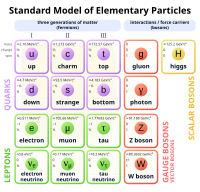
Photo from wikipedia
Coherent forward scattering processes by neutrino-scalar nonstandard interactions (SNSI) induce an effective neutrino mass. In the early Universe, a large neutrino effective mass restricts the production of neutrinos. The SNSI… Click to show full abstract
Coherent forward scattering processes by neutrino-scalar nonstandard interactions (SNSI) induce an effective neutrino mass. In the early Universe, a large neutrino effective mass restricts the production of neutrinos. The SNSI effect is modulated by two effective couplings; these account for the coupling between neutrinos and electrons or positrons, ${G}_{\mathrm{eff}}$, and the neutrino self-interaction ${G}_{\mathrm{S}}$. These parameters are directly related to the effective number of relativistic species, and nonzero values imply a smaller than expected ${N}_{\mathrm{eff}}$. We employ big bang nucleosynthesis to constraint the SNSI effect. We find that ${G}_{\mathrm{eff}}l1.2\text{ }\text{ }{\mathrm{MeV}}^{\ensuremath{-}2}$ and ${G}_{\mathrm{S}}l2.0\ifmmode\times\else\texttimes\fi{}{10}^{7}\text{ }\text{ }{\mathrm{MeV}}^{\ensuremath{-}2}$ at 68% C.L. For a scalar mass in the range ${10}^{\ensuremath{-}15}\text{ }\text{ }\mathrm{eV}\ensuremath{\lesssim}{m}_{\ensuremath{\phi}}\ensuremath{\lesssim}{10}^{\ensuremath{-}5}\text{ }\text{ }\mathrm{eV}$, our neutrino-scalar coupling constraint is more restrictive than any previous result.
Journal Title: Physical Review D
Year Published: 2021
Link to full text (if available)
Share on Social Media: Sign Up to like & get
recommendations!